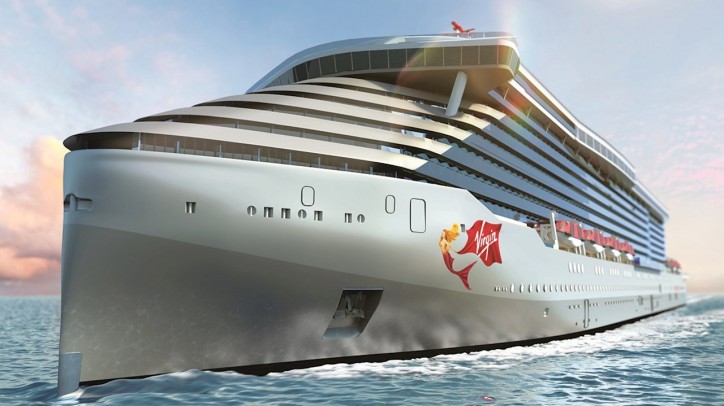ABB to supply the complete electric power and propulsion package for the Virgin Voyages’ new fleet (see also CruiseMapper).
The initial Virgin Voyages vessel, due for delivery in 2020, will be the first of a fleet of three innovative ships designed and built with environmental responsibility in mind.

Each of the 110,000 gross ton vessels will feature ABB’s Azipod® propulsion, a gearless steerable propulsion system where the electric drive motor is in a submerged pod outside the ship hull. Azipod® propulsion has become an industry standard in the cruise segment, with the proven ability to cut fuel consumption by up to 15 percent compared to traditional shaftline propulsion systems.
“Making Virgin Voyages environmentally sustainable is central to our vision and we are delighted ABB’s Azipod® propulsion will help us achieve that goal. Combined with excellent maneuverability, it was a natural choice for our ships,” said Stuart Hawkins, Senior Vice President, Marine & Technical Operations for Virgin Voyages.
“Azipod® electric propulsion stands for innovation and efficiency like no other propulsion system and is fundamental to our vision of electric, digital and connected shipping,” said Peter Terwiesch, president ABB's Industrial Automation division. “Based on 25 years of experience and development, our Azipod® propulsion technology continues to lead ships into the future of e-mobility, underpinning our commitment to a technology with superior performance, reliability, safety and environmental profile.”
Two Azipod® XO units, with a combined propulsion power of 32 MW (43,000 HP) will propel each of the three ships. In addition to highest energy efficiency, Azipod® XO units, where “X” stands for “next generation” and “O” for open water operation, provide high maneuverability and minimal noise for increased passenger comfort.
Each vessel will feature ABB’s complete electric power plant concept – a solution encompassing electricity generators, main switchboards, distribution transformers and a remote control system for maneuvering the Azipod® units from the bridge. The combination of Azipod® propulsion and ABB’s electric power plant concept makes it possible to configure all of the equipment for optimized performance, resulting in increased efficiency and lower emissions.
In line with ABB’s “Electric. Digital. Connected.” approach that envisages shipping’s digital and connected future, these vessels will have the capability to connect to the ABB AbilityTM Collaborative Operations Centers infrastructure. This network uses remote equipment monitoring and data analytics to enable predictive maintenance, planned interventions or even remote technical support.
The four-stroke engines powering the electricity generators – four per vessel – will be equipped with ABB’s TPL-C turbochargers, designed to handle demanding operations and consistently chosen for large cruise ships for their reliability and efficiency.
Each of the ships will be 278 meters long and 38 meters wide, and accommodate more than 2,700 passengers and 1,150 crew. All three ships will be built at the Fincantieri shipyard in Genoa, Italy, with the second and third vessel deliveries scheduled for 2021 and 2022 respectively.
Since the first installation over 25 years ago, Azipod® propulsion has saved approximately 700,000 tons of fuel while clocking up close to 15 million running hours at an impressive availability rate of 99.8 percent. In March 2018, Azipod® propulsion secured its 100th contract for powering a cruise ship.
By being placed outside of the hull, the Azipod® propulsion system frees up space for more cabins. Due to minimal noise and vibration, Azipod® propulsion also improves passenger and crew comfort. The units’ ability to turn in all directions increases cruise ships’ access to ports without tug assistance. Options for Azipod® propulsion now span 1.5MW to 22MW.
Source: ABB